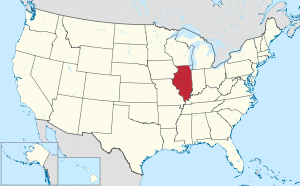Bureau County, Illinois: Difference between revisions
m Fix LaSalle County Spelling, Replaced: La Salle County → LaSalle County (2) using AWB |
|||
| Line 38: | Line 38: | ||
*[[Henry County, Illinois|Henry County]] - west |
*[[Henry County, Illinois|Henry County]] - west |
||
*[[Whiteside County, Illinois|Whiteside County]] - northwest |
*[[Whiteside County, Illinois|Whiteside County]] - northwest |
||
[[Big Bureau Creek]] is the main body of water. |
|||
==History== |
==History== |
||
Revision as of 17:14, 22 February 2007
Bureau County | |
|---|---|
 Location within the U.S. state of Illinois | |
 Illinois's location within the U.S. | |
| Coordinates: 41°25′N 89°32′W / 41.41°N 89.53°W | |
| Country | |
| State | |
| Founded | 1837 |
| Seat | Princeton |
| Largest city | Princeton |
| Population (2000) | |
• Total | 35,503 |
| Time zone | UTC−6 (Central) |
| • Summer (DST) | UTC−5 (CDT) |
Bureau County is a county located in the U.S. state of Illinois. As of the 2000 census, the population was 35,503. Its county seat is Princeton, Illinois6.
Geography
According to the U.S. Census Bureau, the county has a total area of 2,262 km² (873 mi²). 2,250 km² (869 mi²) of it is land and 12 km² (5 mi²) of it (0.54%) is water.
Adjacent Counties
- Lee County - northeast
- Putnam County - east
- LaSalle County - east
- Marshall County - southeast
- Stark County - southwest
- Henry County - west
- Whiteside County - northwest
Big Bureau Creek is the main body of water.
History
Bureau County was organized out of Putnam County in 1837. It is named for Pierre de Beuro, a "half-breed" (French and Native American?), who, around 1818, established a trading post near where Bureau Creek empties into the Illinois River.
Demographics

| Census | Pop. | Note | %± |
|---|---|---|---|
| 1900 | 41,112 | — | |
| 1910 | 43,975 | 7.0% | |
| 1920 | 42,648 | −3.0% | |
| 1930 | 38,845 | −8.9% | |
| 1940 | 37,600 | −3.2% | |
| 1950 | 37,711 | 0.3% | |
| 1960 | 37,594 | −0.3% | |
| 1970 | 38,541 | 2.5% | |
| 1980 | 39,114 | 1.5% | |
| 1990 | 35,688 | −8.8% | |
| 2000 | 35,503 | −0.5% | |
| IL Counties 1900-1990 | |||
As of the census² of 2000, there were 35,503 people, 14,182 households, and 9,884 families residing in the county. The population density was 16/km² (41/mi²). There were 15,331 housing units at an average density of 7/km² (18/mi²). The racial makeup of the county was 96.79% White, 0.33% Black or African American, 0.17% Native American, 0.51% Asian, 0.03% Pacific Islander, 1.28% from other races, and 0.88% from two or more races. 4.88% of the population were Hispanic or Latino of any race.
There were 14,182 households out of which 30.70% had children under the age of 18 living with them, 58.10% were married couples living together, 8.00% had a female householder with no husband present, and 30.30% were non-families. 27.00% of all households were made up of individuals and 14.00% had someone living alone who was 65 years of age or older. The average household size was 2.47 and the average family size was 2.99.
In the county the population was spread out with 24.70% under the age of 18, 7.40% from 18 to 24, 26.20% from 25 to 44, 23.80% from 45 to 64, and 17.70% who were 65 years of age or older. The median age was 40 years. For every 100 females there were 94.40 males. For every 100 females age 18 and over, there were 91.50 males.
The median income for a household in the county was $40,233, and the median income for a family was $48,488. Males had a median income of $35,690 versus $21,315 for females. The per capita income for the county was $19,542. About 5.40% of families and 7.30% of the population were below the poverty line, including 9.90% of those under age 18 and 6.00% of those age 65 or over.
Cities and towns
- Arlington
- Buda
- Bureau Junction
- Cherry
- Dalzell
- De Pue
- Dover
- Hollowayville
- La Moille
- Ladd
- Malden
- Manlius
- Mineral
- Neponset
- New Bedford
- Ohio
- Princeton
- Seatonville
- Sheffield
- Spring Valley
- Tiskilwa
- Walnut
- Wyanet

